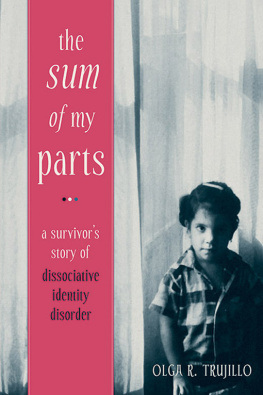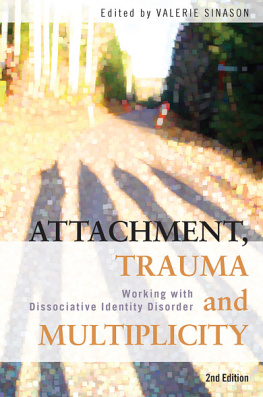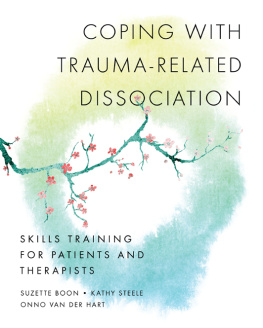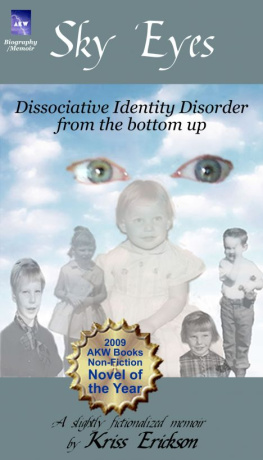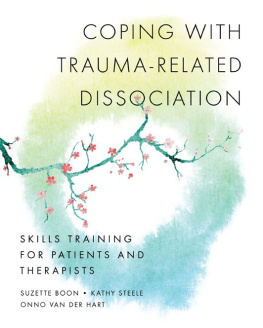Haddock - The Dissociative Identity Disorder Sourcebook
Here you can read online Haddock - The Dissociative Identity Disorder Sourcebook full text of the book (entire story) in english for free. Download pdf and epub, get meaning, cover and reviews about this ebook. City: Chicago, year: 2001, publisher: McGraw-Hill Education;Contemporary Books, genre: Romance novel. Description of the work, (preface) as well as reviews are available. Best literature library LitArk.com created for fans of good reading and offers a wide selection of genres:
Romance novel
Science fiction
Adventure
Detective
Science
History
Home and family
Prose
Art
Politics
Computer
Non-fiction
Religion
Business
Children
Humor
Choose a favorite category and find really read worthwhile books. Enjoy immersion in the world of imagination, feel the emotions of the characters or learn something new for yourself, make an fascinating discovery.

- Book:The Dissociative Identity Disorder Sourcebook
- Author:
- Publisher:McGraw-Hill Education;Contemporary Books
- Genre:
- Year:2001
- City:Chicago
- Rating:3 / 5
- Favourites:Add to favourites
- Your mark:
- 60
- 1
- 2
- 3
- 4
- 5
The Dissociative Identity Disorder Sourcebook: summary, description and annotation
We offer to read an annotation, description, summary or preface (depends on what the author of the book "The Dissociative Identity Disorder Sourcebook" wrote himself). If you haven't found the necessary information about the book — write in the comments, we will try to find it.
Haddock: author's other books
Who wrote The Dissociative Identity Disorder Sourcebook? Find out the surname, the name of the author of the book and a list of all author's works by series.
The Dissociative Identity Disorder Sourcebook — read online for free the complete book (whole text) full work
Below is the text of the book, divided by pages. System saving the place of the last page read, allows you to conveniently read the book "The Dissociative Identity Disorder Sourcebook" online for free, without having to search again every time where you left off. Put a bookmark, and you can go to the page where you finished reading at any time.
Font size:
Interval:
Bookmark:
The Dissociative Identity Disorder Sourcebook
Deborah Bray Haddock,
M.Ed., M.A., L.P
Foreword by James A. Chu, M.D.


Copyright 2001 by The McGraw-Hill Companies, Inc. All rights reserved. Except as permitted under the United States Copyright Act of 1976, no part of this publication may be reproduced or distributed in any form or by any means, or stored in a database or retrieval system, without the prior written permission of the publisher.
ISBN: 978-0-07-150726-4
MHID: 0-07-150726-4
The material in this eBook also appears in the print version of this title: ISBN: 978-0-73-730394-0, MHID: 0-73-730394-8.
All trademarks are trademarks of their respective owners. Rather than put a trademark symbol after every occurrence of a trademarked name, we use names in an editorial fashion only, and to the benefit of the trademark owner, with no intention of infringement of the trademark. Where such designations appear in this book, they have been printed with initial caps.
McGraw-Hill eBooks are available at special quantity discounts to use as premiums and sales promotions, or for use in corporate training programs. To contact a representative please e-mail us at bulksales@mcgraw-hill.com.
This book is not intended to be used for the purpose of diagnosing or treating dissociative identity disorder.
In all examples, names and certain specific details have been changed to protect confidentiality.
TERMS OF USE
This is a copyrighted work and The McGraw-Hill Companies, Inc. (McGrawHill) and its licensors reserve all rights in and to the work. Use of this work is subject to these terms. Except as permitted under the Copyright Act of 1976 and the right to store and retrieve one copy of the work, you may not decompile, disassemble, reverse engineer, reproduce, modify, create derivative works based upon, transmit, distribute, disseminate, sell, publish or sublicense the work or any part of it without McGraw-Hills prior consent. You may use the work for your own noncommercial and personal use; any other use of the work is strictly prohibited. Your right to use the work may be terminated if you fail to comply with these terms.
THE WORK IS PROVIDED AS IS. McGRAW-HILL AND ITS LICENSORS MAKE NO GUARANTEES OR WARRANTIES AS TO THE ACCURACY, ADEQUACY OR COMPLETENESS OF OR RESULTS TO BE OBTAINED FROM USING THE WORK, INCLUDING ANY INFORMATION THAT CAN BE ACCESSED THROUGH THE WORK VIA HYPERLINK OR OTHERWISE, AND EXPRESSLY DISCLAIM ANY WARRANTY, EXPRESS OR IMPLIED, INCLUDING BUT NOT LIMITED TO IMPLIED WARRANTIES OF MERCHANTABILITY OR FITNESS FOR A PARTICULAR PURPOSE. McGraw-Hill and its licensors do not warrant or guarantee that the functions contained in the work will meet your requirements or that its operation will be uninterrupted or error free. Neither McGraw-Hill nor its licensors shall be liable to you or anyone else for any inaccuracy, error or omission, regardless of cause, in the work or for any damages resulting therefrom. McGraw-Hill has no responsibility for the content of any information accessed through the work. Under no circumstances shall McGraw-Hill and/or its licensors be liable for any indirect, incidental, special, punitive, consequential or similar damages that result from the use of or inability to use the work, even if any of them has been advised of the possibility of such damages. This limitation of liability shall apply to any claim or cause whatsoever whether such claim or cause arises in contract, tort or otherwise.
To Milt
Wethe community of those who study, treat, or live with dissociative disordershave been waiting for this book for a long time. The Dissociative Identity Disorder Sourcebook is a welcome new addition to the growing literature on the treatment of persons with multiple identities. Deborah Haddock has a gift for being able to explain complex phenomenology in clear and understandable language. Her book provides valuable information to clinicians who are relatively new to the diagnosis and treatment of dissociative identity disorder (DID). Most important, however, is that this book provides welcome guidance to persons with DID.
Is there anything I can read to help me understand my problems? I have been asked this question by dozens of people who were beginning their treatment for dissociative difficulties. Other than some first-person accounts and basic booklets, there has been little to recommend to them. The Dissociative Identity Disorder Sourcebook is the first resource to describe the genesis of DID and the process of treatment with both simplicity and sophistication. This book is truly appropriate for use by patients, who should pace their reading as tolerated in consultation with their therapists.
The Dissociative Identity Disorder Sourcebook explains the intermix of dissociative and posttraumatic symptoms, difficulties with self-esteem, and relational problems, tracing their roots as adaptive mechanisms that derive from overwhelmingly traumatic experiences. As a result, this book may go a long way to help to destigmatize and depathologize these difficulties, to reduce the secret shame that all childhood abuse survivors suffer, and to explain the experience of persons with DID to a wide audience.
The Dissociative Identity Disorder Sourcebook is written from the patients perspective and is eminently practical. For example, choosing a therapist is often a huge hurdle, but this book describes all the stepslocating a therapist, dealing with insurance when selecting a therapist, describing the qualities of therapists that are helpful and the different treatment approaches that therapists may use. I found the information on what is not good or appropriate therapy particularly useful in defining what both patients and therapists need to do to make sure that boundaries of a good therapeutic relationship are established and respected.
The Dissociative Identity Disorder Sourcebook describes the process of therapy, including the phases of treatment, and gives many useful exercises and tools. For example, in the discussion of the critical process of stabilization are many examples of grounding techniques and help on how to set up a basic safety plan. The sections on how to begin work with alter personalities, to share information, and to manage feelings are extremely helpful in beginning the process of treatment. The Dissociative Identity Disorder Sourcebook also addresses the dilemmas that inevitably arise in treatment and offers practical advice about how they may be understood and resolved.
Perhaps the strongest theme of this book is its empowering message of hope. Although the treatment of DID is realistically portrayed as long term, treatment is described as possible and doable. The tasks and difficulties in treatment are not minimized, and Deborah Haddock emphasizes patients active role in treatment beyond just passively accepting nurturance and guidance. It is perhaps this messagethat persons with DID must accept responsibility for their problems even though they were induced by others and feel totally outside their control, and that they must strive to trust others to help find solutions to these problemsthat is the most important, empowering, and enduring contribution this book can make.
Next pageFont size:
Interval:
Bookmark:
Similar books «The Dissociative Identity Disorder Sourcebook»
Look at similar books to The Dissociative Identity Disorder Sourcebook. We have selected literature similar in name and meaning in the hope of providing readers with more options to find new, interesting, not yet read works.
Discussion, reviews of the book The Dissociative Identity Disorder Sourcebook and just readers' own opinions. Leave your comments, write what you think about the work, its meaning or the main characters. Specify what exactly you liked and what you didn't like, and why you think so.





